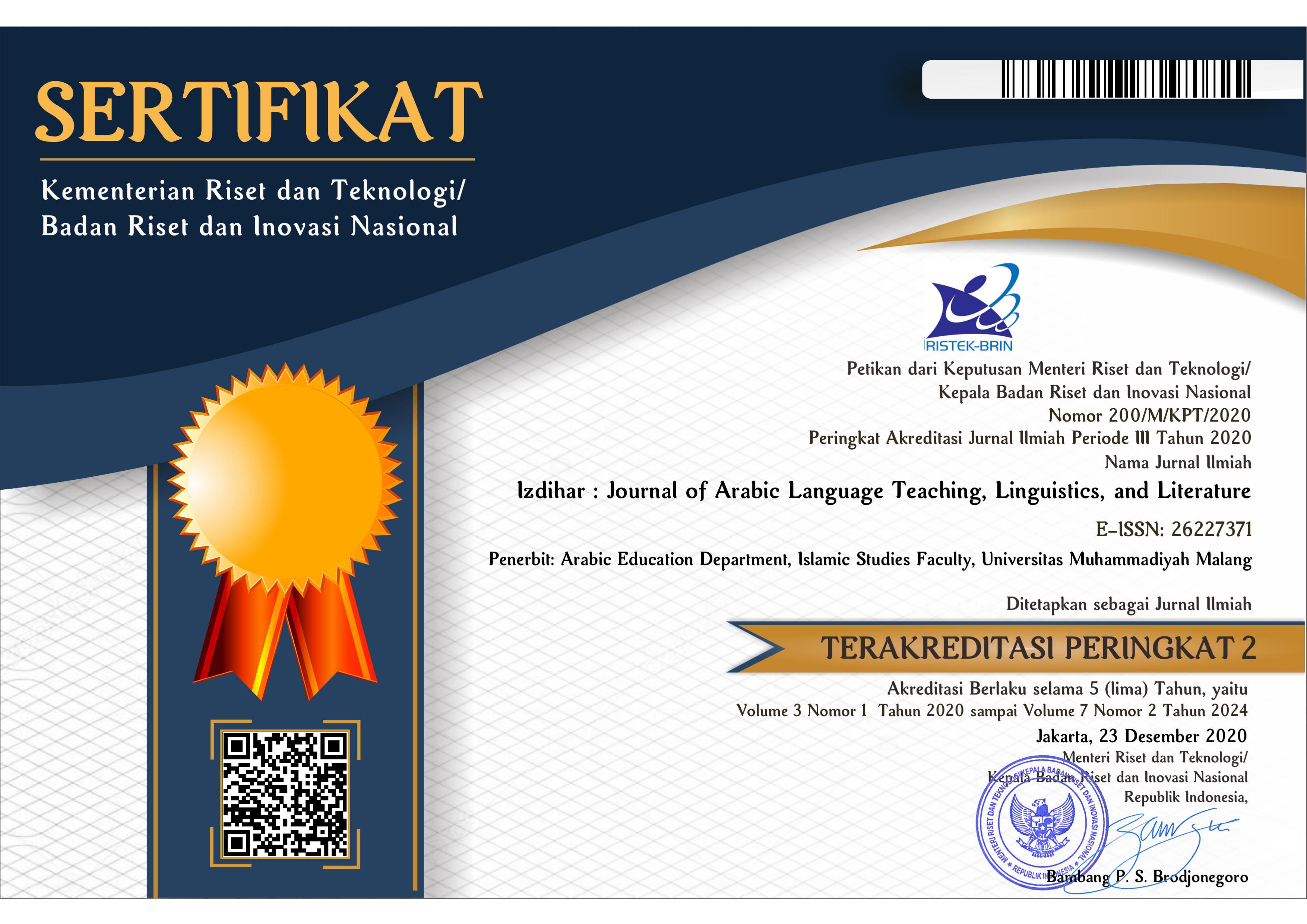دراسة تحليلية وصفية عن الأسماء المشتقة في سورة الطارق
DOI:
https://doi.org/10.22219/izdihar.v1i2.7299Keywords:
Derivative Study, Derivation, Arabic Word Derivatives, Solid Noun (Ism Jamid)Abstract
Linguists consider that the study of derivatives is an important subject in the study of Arabic language because it has characteristics that differ from other languages in the world. Arabic language teaching in Indonesia is widespread, this study has not been a top place among Arab students. Starting from this point of views, in this article the researcher would like to contribute the share in this study, especially on the words derivatives in Surat Al-Tarik, it becomes from this point of view, a common derivative study in the hands of Arab students as is commonly known. The researcher used qualitative research in his research, which the type of qualitative desk study is the descriptive method, and the researcher used the method of content analysis to get access to the information. The result of this research is that the derivatives names in this surah are ha>fiz{, da>fiq, qa>dir, na>s}ir, and al-ka>firi>n.Downloads
References
الأفغاني، سعيد. 1957. في أصول النحوي. دمشق: مطبع الجامعة السورية.
ابن الأنباري، أبي البركات. 1960. الإنصاف في مسائل الاختلاف بين البصريين والكوفيين. القاهرة: مكتبة الخانجي.
الثواب، رمضان عبد. 1999. فصول في فقه العربية. القاهرة: مكتبة الخانجي.
الصالح، صبحي إبراهيم. 1978. دراسات في فقه اللغة. الطبعة السابعة. بيروت: دار العلم الملايين.
السيوطي، جلال الدين. دون السنة. المزهر في علوم اللغة وأنواعها. الجز الأول. بيروت: دار الفكر.
معن، مشتاق عباش. 1971. المعحم المفصل في فقه اللغة. لبنان: دار الكتب العلمية.
عبد المقصود، محمد عبد المقصود. 2017. مفهوم الاشتقاق الصرفي وتطوره عند النحويين والأصوليين. مكتبة الثقافة الدينية.
بن مالك ، جمال الدين محمد بن عبد الله. دون السنة. ألفية ابن مالك في علم النحو والصرف، ج. الأول ليربيا كديري: دار المبتدئين.
نعمة، فؤاد. دون السنة. ملخص قواعد اللغة الغربية. بيروت: دار الثقافة الإسلامية.
يعقوب، إميل بديع. 1982. فقه اللغة العربية وخصائصها. بيروت: دار العلم الملايين.
Ayyash, J. H., Ahmad, S., & Abdullah, M. N. (2013). نماذج من جناس الاشتقاق في القرآن الكريم. International Journal of Islamic Thought, 3(1), 113-120.
Basith, A. (2015). الاشتقاق بين القدماء والمحدثين. LISANUDHAD, 2(1).
Sugiono. )2014(. Metode penelitian kuanlitatif kualitatif dan R&D, cetakan ke dua puluh satu Bandung: Alvabeta.
Suryadarma, Y. (2015). المقارنة بين علم اللغة التقابلي وتحليل الأخطاء. LISANUDHAD, 2(1).
Suryadarma, Y. (2016). التدريبات اللغوية المشوقات في تعليم اللغة العربية على ضوء المهارة الكتابة. LISANUDHAD, 3(2).
Khumaeroh, S. (2017). (الاشتقاق في مادة" حاء سين باء" و معانيها في القرآن الكريم (الاشتقاق الأكبر والاشتقاق الصغير. AL-MA'RIFAH, 14 (02),
Krippendorff, K., & Wajidi, F. (1980). Analisis isi: Pengantar teori dan metodologi. Rajawali Pers.
Downloads
Published
How to Cite
Issue
Section
License
Copyright Notice
Authors who publish with this journal agree to the following terms:
- Authors retain copyright and grant the journal right of first publication with the work simultaneously licensed under a Creative Commons Attribution-ShareAlike 4.0 International License that allows others to share the work with an acknowledgment of the work's authorship and initial publication in this journal.
- Authors are able to enter into separate, additional contractual arrangements for the non-exclusive distribution of the journal's published version of the work (e.g., post it to an institutional repository or publish it in a book), with an acknowledgment of its initial publication in this journal.
- Authors are permitted and encouraged to post their work online (e.g., in institutional repositories or on their website) prior to and during the submission process, as it can lead to productive exchanges, as well as earlier and greater citation of published work (See The Effect of Open Access).
Copyright (c) 2019 Izdihar : Journal of Arabic Language Teaching, Linguistics, and Literature

This work is licensed under a Creative Commons Attribution-ShareAlike 4.0 International License.


















